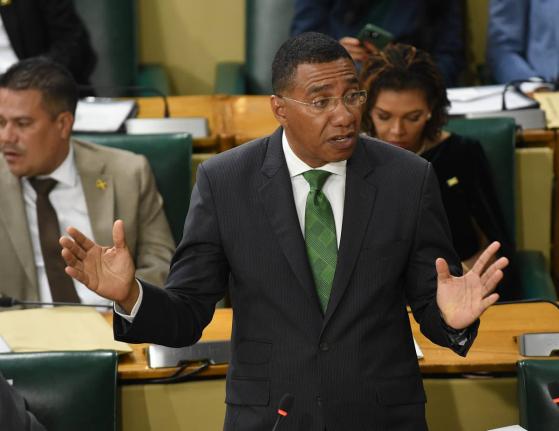Editorial | Management for growth
Loading article...

The question is no longer about the policy priorities for escaping Jamaica’s low-growth trap – from lowering energy costs, to establishing development corridors and transformational action in education training.
The problem is how to get them done. For despite the myriad mechanisms attempted over the past quarter century, the gap between policy and performance remains wide.
The circumstances require new ways of doing things. The Gleaner, in this regard, proposes two fundamental adjustments for providing strategic oversight of policy priorities, and for keeping them on track.
The prime minister should establish a National Growth and Transformation Council (NGTC), which he chairs, that brings together the ministers of finance; economic growth; industry, energy, education, and security as well as private sector leaders. The PM may consider inviting the Opposition to name a member. Meeting quarterly, the NGTC would track policy implementation and, critically, remove blockages.
Simultaneously, the Planning Institute of Jamaica (PIOJ) should evolve into a dynamic National Delivery Secretariat – the operational engine that translates vision into measurable outcomes. In its transformed role, the PIOJ would coordinate across ministries, monitor key performance indicators, and operate a real-time dashboard showing where projects stand. This approach would help to bring the discipline of visibility to a culture that too often hides delay behind bureaucracy.
A special unit in The Office of the Prime Minister, from the perspective of growth and development, would focus on the top 25 flagship projects.
NO MORE EXCUSES
When projects falter, matters would escalate directly to the prime minister for intervention. No more drifting timelines and budgets. No more excuses lost in the inter-ministerial fog.
With respect to the PIOJ, it must, in this new phase, become the chief integrator and monitor of transformation.
In other words, it would align sectoral plans, budgets, and projects into one National Growth Strategy, published quarterly for Cabinet and the public. This would require the PIOJ to work with ministries and agencies to break national priorities into specific deliverables with timelines and financing plans, in addition to using its current management data from across the public sector agencies to issue early warning briefs about emerging critical trends.
The aim is to make planning adaptive and forward-looking; policy guided not by instinct, but by real-time evidence.
At the granular operational level, each ministry must become a disciplined delivery cell within the larger growth and development ecosystem.
While the finance ministry continues to anchor macroeconomic stability, it must in the new dispensation link every budget line to results: performance-based budgeting tied to national KPIs.
The ministry of economic growth would lead spatial transformation – connecting Kingston, May Pen, and Montego Bay through serviced industrial parks, digital corridors, and climate-resilient infrastructure.
The Ministry of Industry, Investment and Commerce should drive sectoral competitiveness: agro-processing, logistics, digital services, and manufacturing – ensuring that SEZs comply with international rules but deliver domestic linkages and jobs.
The education ministry would realign curricula and training to match industrial and technological priorities.
The energy and telecommunications ministry would be obliged to accelerate modernising our energy mix and the buildout of broadband backbone, while the national security ministry must continue the hard work of building a secure environment.
MINISTRY DELIVERY UNITS
All ministries would operate Ministry Delivery Units (MDUs) – small, agile teams dedicated solely to implementing and tracking key projects, feeding into the PIOJ dashboard. Weekly progress reviews would replace annual reporting. Accountability needs to replace amnesia.
But institutions alone are not enough; execution requires trust. That trust must be rebuilt through shared oversight.
So, separate from operation mechanisms within the public sector, an Economic Growth and Implementation Oversight Committee (GIOC) should be established to monitor, verify, and publicly report results.
It would not duplicate government. It would amplify confidence, the hidden capital of any economy. Citizens must be able to see where their taxes go and how national goals advance.
To institutionalise continuity, Parliament should adopt an Implementation Compact – a bipartisan agreement setting measurable targets: average five per cent GDP growth; 60 per cent debt-to-GDP by 2026; 50 per cent renewable energy by 2035’ and a 40 per cent reduction in homicides.
Each target would have a lead ministry, quarterly milestones, and independent audits. These would be monitored by the Economy and Production Committee of Parliament.
Continuity must be legislated, not left to goodwill. No national plan works without local capacity.
Growth corridors – the arteries of modern Jamaica – must have real inputs from municipal authorities, utilities, developers, and community groups.
Local planning must go digital: GIS mapping, e-permitting, and cadastral modernisation to unlock land and speed investment.
The private sector, meanwhile, must move some of its efforts and input to the local levels. The local private sector at the parish levels should not be excluded in favour of national bodies.
Through public-private partnerships and diaspora co-investment funds, it can help finance renewable projects, logistics hubs, and digital infrastructure.
The PIOJ can act as a neutral platform to align incentives and measure results.
Ultimately, execution is not merely a technocratic matter. It is also a moral one. It asks Jamaicans whether they are serious about themselves and whether they can build a society where commitment outlasts campaigns, and results outshine rhetoric.
The national culture, in addition to creativity and resilience, must also prize reliability.
Leadership must set the tone. The Prime Minister must become Chief Policy Executor, not only Chief Visionary. Ministers must manage by dashboard, not by speech.
And the public must demand performance with the same energy that it demands entertainment. The road to sustained growth no longer lies in new ideas, it lies in disciplined delivery.